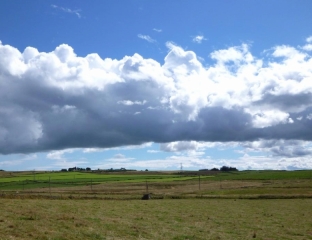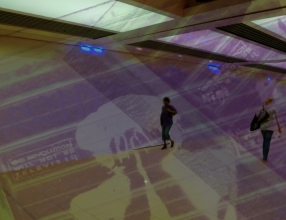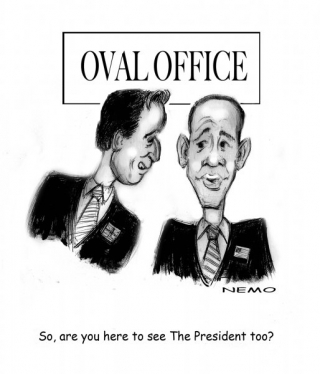By Alan Gatt.
Last week Aberdeen Voice brought you part 2 of Alan Gatt’s examination of where Aberdeen and Aberdonians are going wrong, and focussed on the Dutch disease, Affluenza and Hyperreality. This week, in part three Alan Takes a look at General Well-being and Reality Distortion Field.
In Powell and Pressberger’s 1945 classic “I Know Where I’m Going”, Wendy Hiller’s stranger-in-a-strange-land banker’s daughter is treated to a lightbulb moment via the indulgence of Roger Livesey’s Hebridean laird:
Hiller: People around here are very poor I suppose.
Livesey: Not poor, they just haven’t got money.
Hiller: It’s the same thing.
Livesey: Oh no, it’s something quite different.
When he was in opposition our new PM David Cameron was keen to promote a similar message. Speaking at the Google Zeitgeist Europe conference in 2006 he said:
Too often in politics today, we behave as if the only thing that matters is the insider stuff that we politicians love to argue about – economic growth, budget deficits and GDP.
GDP. Gross domestic product. Yes it’s vital. It measures the wealth of our society. But it hardly tells the whole story. Wealth is about so much more than pounds, or euros or dollars can ever measure. It’s time we admitted that there’s more to life than money, and it’s time we focused not just on GDP, but on GWB – general well-being. Well-being can’t be measured by money or traded in markets. It can’t be required by law or delivered by government. It’s about the beauty of our surroundings, the quality of our culture, and above all the strength of our relationships.
Improving our society’s sense of well-being is, I believe, the central political challenge of our times. It’s a challenge foreshadowed by one of Britain’s most famous economists – though not someone whose work I usually agree with. Writing in 1930, John Maynard Keynes predicted that by now, society would have “solved its economic problem” – that is, worked out how to create permanently rising standards of living.
Aspiration is insecurity. So we volunteer to place the shackles around our own ankles
In his essay, Economic Possibilities for our Grandchildren, he argued: “For the first time since his creation man will be faced with his real, his permanent problem – how to use his freedom from pressing economic cares, how to occupy the leisure, which science and compound interest will have won for him, to live wisely and agreeably and well.”
In that essay of Keynes’ which Cameron mentioned, Keynes suggested that by 2030 we’d be about eight times better off economically than we were in 1930. And that once we’d achieved that level of affluence, we’d only find it necessary to work about 15 hours per week. The rest of the time, we could be humans; free to “do one thing to-day and another to-morrow, to hunt in the morning, fish in the afternoon, rear cattle in the evening, criticize after dinner” as Marx would have it.
Well, since about 1986 Marx has been unmentionable and in our neocon times (which started in 1979) Keynes is perennially unfashionable, but the fact is that we achieved that ‘eight times better off’ quite some time ago. Of course – Keynes posited – there would still be some individuals who would work harder and for longer hours than others in pursuit of greater monetary wealth, but most wouldn’t – seeing the love of money as “one of those semi-criminal, semi-pathological propensities”.
So what’s going on? Why do we feel we must work so hard? It seems that as we aspire to the next level on the upgrade cycle – (best not fall behind our neighbours, colleagues, friends and family!) our anxieties are played upon and our insecurities are exploited, and so we give up our freedom to hours greatly in excess of the working time directive, let alone Keynes’ 15 hours. Aspiration is insecurity. So we volunteer to place the shackles around our own ankles. “Prosperity without freedom is just another form of poverty”.
REALITY DISTORTION FIELD.
So, where’s Aberdeen going wrong? Hyperreality? Dutch Disease? Affluenza? Resource Depletion? All of these things are present. But what I percieve in Aberdeen is a sort of un-founded self-belief. A vainglorious boastfulness which ill-serves us when compared with our peers. In “A Big Boy did it and Ran Away” Scottish author Christopher Brookmyre spells it out as the protagonist mulls the Aberdonian condition:
Europe’s Oil Capital. Honestly. The first time he heard the expression, he’d assumed it was a bit of self deprecatory humour. That was before he learned that there was no such thing as self-deprecatory humour in Aberdeen, particularly when it came to the town’s utterly unfounded conceit of itself. It was a provincial fishing port that had struck it astronomically lucky with the discovery of North Sea oil, and the result was comparable to a country bumpkin who had won the lottery, minus the dopey grin and colossal sense of incredulous gratitude. The prevalent local delusion wasn’t that the town had merely been in the right place at the right time, but that it had somehow done something to deserve this massive good fortune, and not before time either.
So even with all these things going wrong all around – the visible decay and the social exclusion; the decline of our elder industries and the planning blight despoiling the town centre – we still think we’re Ertchie! A couple of weeks ago I had an argument with an Aberdeen blogger who claimed that the North East “contributed 24% of all corporation tax to the UK exchequer”. What he’d actually heard at a “business breakfast briefing” was, that, following the recent budget Aberdeen “City and Shire” businesses will be paying UK Corporation tax at the rate of 24%. He grabbed a hold of the wrong end of the stick. And then proceeded to wave it about drawing attention to himself. This sort of thing – this sort of thinking – is typical.
So I think that the biggest thing going wrong in Aberdeen is a sort of self-regarding reality-distortion-field. A shame. Because it is actually a really attractive modestly-sized town that needs no overenthusiastic boosterism. We should recognise and celebrate Aberdeen for what it is; not for what the reality-distortion-field of some has convinced them it should be.
The affluenza-driven self-regard of the pompous reality-distortion-field is trapping us in an illusion of Aberdeen which is compounded by our condition of hyperreality. That vainglorious self-reverence which confuses surface with substance is yet another example of our lack of freedom. Voltaire said something like: “It’s hard to free people from the chains they revere”.
Obama said: “Prosperity without freedom is just another form of poverty”.


